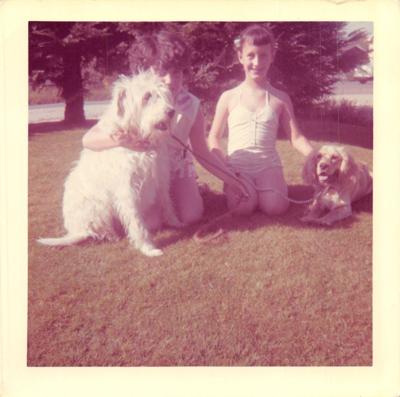Last summer, on July 7, 2024, when I read that Alice MunroÔÇÖs daughter revealed her stepfather had abused her, I couldnÔÇÖt breathe.
Andrea Robin Skinner wrote that she told her mother because Alice had spoken about a short story involving incest ÔÇö in which a daughter hadnÔÇÖt told the mother.
More than 30 years previously, in the winter of 1992, I learned ▒§ÔÇÖd received an endorsement for ÔÇťMarine Life,ÔÇŁ my first book. It was, shockingly, from Alice Munro. She said, ÔÇťLinda SvendsenÔÇÖs stories are stunning ÔÇö so easily embodying such terrific power. The last story left me shaking.ÔÇŁ
- Andrea Robin Skinner
That last story in this linked collection (unconsciously, but maybe also shamelessly modelled after MunroÔÇÖs ÔÇťWho Do You Think You Are?) is the one Andrea Robin Skinner refers to in her eventual letter to Alice in 1993 ÔÇö thereÔÇÖs a screenshot in her Star essay.
It was AliceÔÇÖs response to that particular story which empowered Andrea to share the secret that sheÔÇÖd kept for years: that her stepfather, MunroÔÇÖs second husband, Gerald Fremlin, had abused her when she was nine and had continued these assaults, accompanied by threats, until sheÔÇÖd reached puberty. MunroÔÇÖs husband was a pedophile.
I was astounded: by what had happened to her; by the silence of the family; by her courage in going to the Ontario Provincial Police and to court. Astounded by the support and love of her siblings. By the unconscionable, unreachable, unfathomable Alice.
▒§ÔÇÖd worked on the stories in ÔÇťMarine LifeÔÇŁ over fourteen years, off and on ÔÇö starting in graduate school in 1978. When ▒§ÔÇÖd moved to New York, my own lower middle-class background as a youngest daughter with far older half-sisters and half-brother seemed exotic. And, I felt safely far away from my family. A continuation of being unseen and unheard which unleashed ÔÇö something.
I could write the fictionalized truth of what ▒§ÔÇÖd lived because fiction felt far away from family in Canada. And physically, I was. I didnÔÇÖt consider them reading it. They didnÔÇÖt read books, really.
How does one live inside abuse?
In AndreaÔÇÖs case, she told trusted others. Eventually, Andrea told Munro the truth. Munro left the marriage but ultimately returned, actually recommitted, to the perpetrator. Even after Andrea took Fremlin to court and won the case. Munro remained with him until he died. Andrea bore all of this.
In my case, the abuser is uncharged.
I wrote him into ÔÇťWhite Shoulders,ÔÇŁ as a husband ÔÇö the story deals with a man who is sexually abusing his daughter. At a crucial moment, the protagonist chooses to collude in covering up the crime rather than to reveal what sheÔÇÖs found out.┬á
Andrea, in her essay for the Star, noted that Alice had asked her about this story, and in particular why the daughter wouldnÔÇÖt have told her mother about the fatherÔÇÖs crime. Having written that story, I so wish that I could have answered her.
I would have said: ”Alice, the daughter wanted to protect the mother at all costs.”
- Deborah Dundas, Betsy Powell
I would have said: ”Alice, the father would have punished the mother. And then the daughter. Most likely, both.”
I canÔÇÖt figure out why Alice Munro couldnÔÇÖt see that.
Andrea Robin Skinner has described, as have her siblings, the isolation imposed upon a child being sexually abused by a trusted older member of the extended family and the impact of the nonaction of others. It has something to do with the power of that kept knowledge ÔÇö and understanding its dissemination could destroy an adult loved one. ThatÔÇÖs what lived in me.
It’s like carrying a ticking bomb in your mouth.
Another long story short: my second oldest sister, now deceased, was pitted against her ex-husband for custody of her children. This was back in the 1960s, when I was thirteen. He claimed she was an unfit mother but I didnÔÇÖt want her to lose her children.
I told her about him coming into my bedroom one early evening when I was reading in my bed and suddenly his penis was between me and the page. He asked me to touch it. In my surprise, I did. With my pointer finger. He was the adult. I didnÔÇÖt even know what this was. This took five seconds, if that. He said, ÔÇťDonÔÇÖt tell anyone,ÔÇŁ and he walked out, and I went back to reading, and the shame has lasted more than sixty years.
When I stopped talking, my sister said you have to tell our mother and stepfather.
I did.
They zeroed in on the information about my sisterÔÇÖs ex. They said I did the right thing by telling them. There were discussions about putting me on the stand and testifying.┬áI was a stoic kid, I think. I wanted my sister to have her children back. I was also afraid that if she didnÔÇÖt win custody, she might harm herself.
In the long run, though, it was decided that I wouldnÔÇÖt be subpoenaed. The judge ruled against my sister. She only reconnected with her children in their late teens.
Another abuser ÔÇö a different story. ▒§ÔÇÖd wondered how babies were made. HeÔÇÖd guided my 10-year-old hand over his penis, sheathed with a tissue, and provided show-and-tell. Did anyone ever talk to him about this after ▒§ÔÇÖd finally told them ÔÇö around the time of my sisterÔÇÖs court case? I donÔÇÖt think so.
Meanwhile, decades of Christmases in his presence. The self-consciousness of early puberty ÔÇö turning ten and developing breasts ÔÇö and having my nipples tweaked (ÔÇťTitties!ÔÇŁ) as I skirted him in hallways. Years of being deemed anti-social because when company came, I hid. A trip to an amusement park one summer and a much-anticipated ride: in those days, the child sat upfront, the adult behind ÔÇö in the same bobsled. I remember sitting between his straddled legs. I remember the G-force pushing my body against his ÔÇö and a useless fight to stay upright. About that actual ride┬áÔÇö┬áthe wonder, thrills, surprise┬áÔÇö I recall nothing.
Why didnÔÇÖt I say anything? I can actually hear Alice in my head.┬áI didnÔÇÖt want to hurt anybody. I didnÔÇÖt want to kill anybody ÔÇö because it was always life-and-death for that significant other. Or for their mental health. And then impactful upon children. Then, later, grandchildren. You canÔÇÖt rob them of a beloved grandfather, uncle, cousin, et al. (Oh, how I have come to distrust the word beloved.)
I carried inconvenient knowledge. It threatened the family equilibrium.
Andrea lived this, too. In her ╔ź╔ź└▓ Star essay she wrote, ÔÇťI believe my mother answered her own question about the girl in the story. She didnÔÇÖt tell her mother because she would rather die than risk her own motherÔÇÖs rejection.ÔÇŁ
***
After the sudden death of my mother in the early 1990s, I learned from that same vulnerable second-oldest sister that our stepfather had engaged in sexual relations with her for some time. This was deeply, wrenchingly, shocking. Yet.┬áHeÔÇÖd taken me aside, when I was in my early twenties, to let me know his most vital physical needs were not being met. It didnÔÇÖt occur to me to ever blame my sister for what had transpired: ▒§ÔÇÖd seen enough of his manipulation and rage under the roof heÔÇÖd put over our bowed heads. I will never blame her.
Did I ever confront him? No. I was frightened of him into my forties.
But I avoided him. I was at a family Easter gathering when he limped in with his legendarily bad knee and exuberant greeting. Nobody had said he was coming. I was seven months pregnant with my second baby and my little toddler in hand. I didnÔÇÖt want this person anywhere near my children ÔÇö so, so, so precious ÔÇö nor anywhere near me because I wasnÔÇÖt sure what ▒§ÔÇÖd do. Afterwards, amongst both those who did┬áÔÇö and didnÔÇÖt┬áÔÇö know what may have sent me out the door, I learned that┬á▒§ÔÇÖd┬áruined the occasion.
He’s dead now. His obituary highlighted community and career. The erasure of our family I take as success.
IÔÇÖm 70 years old and still afraid to write about this. I am writing about it.
To give myself permission to write this, I convinced myself I had to read most of Alice MunroÔÇÖs stories. IÔÇÖm not sure why. So, as many readers divested themselves of Munro, I brought more of her into the house. ▒§ÔÇÖd first encountered her work in early 1975 in a Canadian Literature class taught by David Stouck at SFU. He was a huge fan of the shy, pleasant housewife and mother ÔÇö IÔÇÖm paraphrasing ÔÇö from just over there, in North Vancouver. I read ÔÇťDance of the Happy Shades,ÔÇŁ ÔÇťSomething IÔÇÖve Been Meaning To Tell You,ÔÇŁ and ÔÇťLives of Girls and WomenÔÇŁ ÔÇö was wowed; in New York, at her 92nd Street Y reading with Marilynne Robinson, I brought Alice a bouquet because of persistent respect for the reversals in ÔÇťThe Beggar MaidÔÇŁ story. And then when my children arrived my connection to her work faltered ÔÇö although you wouldnÔÇÖt guess that given my tweet when she died last May. ÔÇťI love you.ÔÇŁ Or words to that effect. At the time, I meant it.
But then. Reading her many, many stories, in order, for the first time and rereading others: oh my God, the darkness.
IÔÇÖve written pages of speculation about Munro as embodied in her work ÔÇö childhood trauma/survivor, unwilling parenthood, death of baby Catherine, sexual addiction, alcoholism, Garnet FrenchÔÇÖs initials in her story ÔÇťBaptizingÔÇŁ are GF (Gerald Fremlin) ÔÇö and IÔÇÖve cut them. Who cares what I think? What I did say, though, out loud: ÔÇťI want to take a shower.ÔÇŁ
A month ago I had the opportunity to meet Andrea over email. This was uplifting, spiritual ÔÇö sheÔÇÖs a joy! She shared that my short story had ÔÇťcrash-landed into the deepest partÔÇŁ of her mother. And, as with so many of the different accounts, an unnerving detail was disclosed: that when Alice had talked with Andrea about the story, Fremlin had actually been present. Andrea said Alice wasnÔÇÖt able to look at him. In my own prior reconstruction of this scene, Alice and Andrea had been alone and viable outreach was plausible.
- Sydney Hegele, Contributor
But he was with them. When Alice asked Andrea, ÔÇťWhy wouldnÔÇÖt the daughter tell her mother about sexual abuse?ÔÇŁ, he was seated at that table.
I would have said: ÔÇťOh, Alice.ÔÇŁ┬á
To this day, IÔÇÖve not found the courage to confront my abusers, either in court or over a very public coffee. IÔÇÖve spoken only in prose fiction┬áÔÇö until now.
So weÔÇÖve come full circle. If AndreaÔÇÖs conversation with her mother about ÔÇťMarine LifeÔÇŁ inspired/enabled/emboldened her to tell Alice the truth, then AndreaÔÇÖs revelations about her mother ÔÇö a writer, whom I respected so much, and that writerÔÇÖs choices vis-├á-vis her child, which I donÔÇÖt condone and canÔÇÖt understand ÔÇö have freed me to finally, finally speak non-fiction. And, for that, I thank Andrea with all my heart.






























To join the conversation set a first and last name in your user profile.
Sign in or register for free to join the Conversation